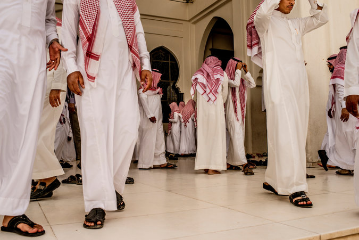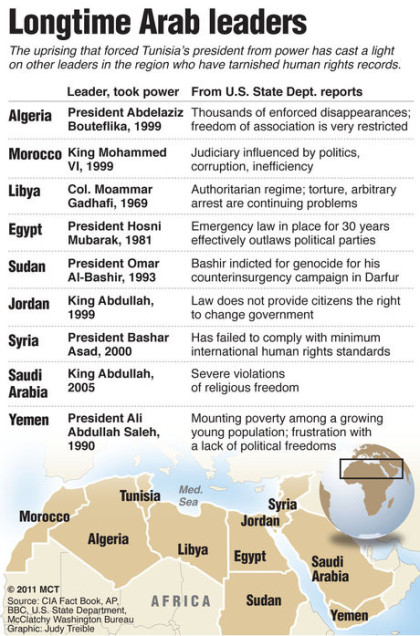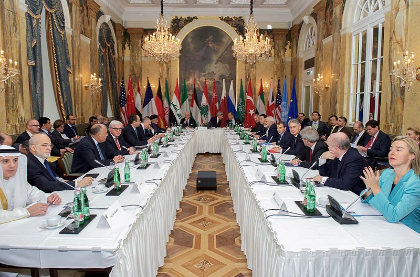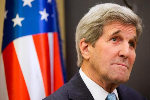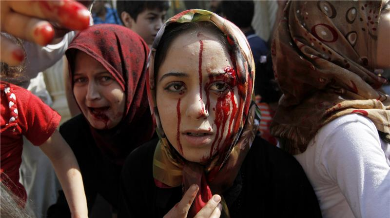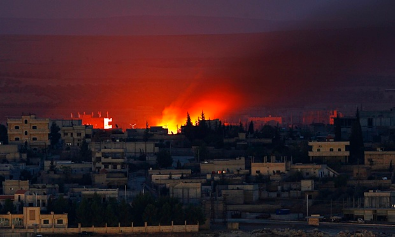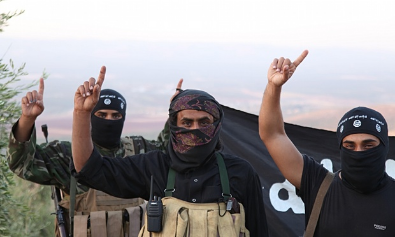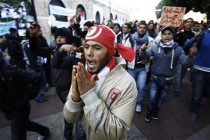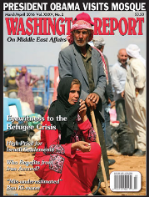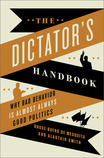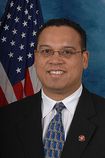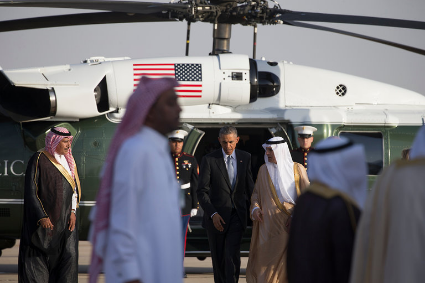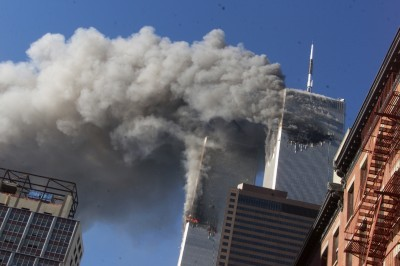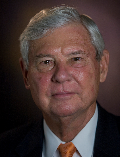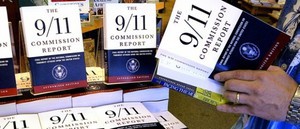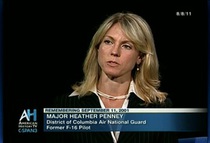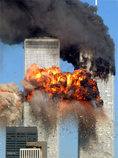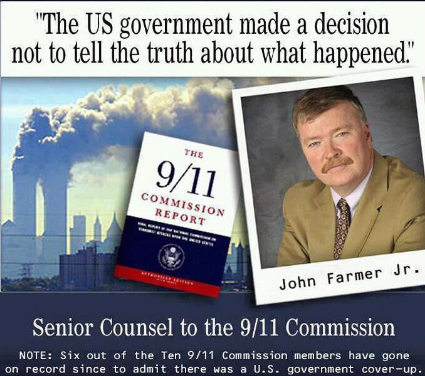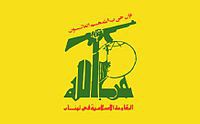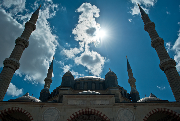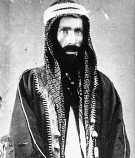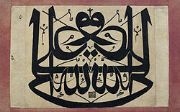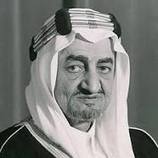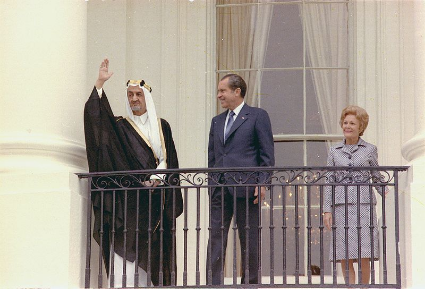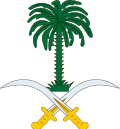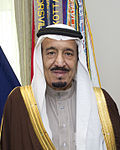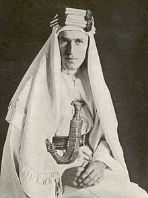Arab Spring. Fall to ISIS. Death of the Arab Spring?
Young Saudis See Cushy Jobs Vanish Along With
Nation’s Oil Wealth
The New York Times
By Ben Hubbard
Feb-16-2016
RIYADH, Saudi Arabia — In pressed white robes and clutching crisp résumés, young Saudi men packed a massive hall at a university in the capital city this month to wait in long lines to pitch themselves to employers.
It was one of three job fairs in Riyadh in two weeks, and the high attendance was fueled in part by fear among the younger generation of what a future of cheap oil will mean in a country where oil is everything.
For decades, the royal family has used the kingdom’s immense oil wealth to lavish benefits on its people, including free education and medical care, generous energy subsidies and well-paid (and often undemanding) government jobs. No one paid taxes, and if political rights were not part of the equation, that was fine with most people.
But the drop in oil prices to below $30 a barrel from more than $100 a barrel in June 2014 means that the old math no longer works. Low oil prices have knocked a chunk out of the government budget and now pose a threat to the unwritten social contract that has long underpinned life in the kingdom, the Arab world’s largest economy and a key American ally. Read more
Syria peace talks in Vienna, 30 October 2015
Vienna/ISSG peace talks for Syria
Wikipedia
The Vienna peace talks for Syria, as of 14 November 2015 known as the talks of the International Syria Support Group (ISSG), are negotiations of foreign powers that began in Vienna, Austria in October 2015 at the level of foreign ministers, to resolve the conflict in Syria, after unsuccessful previous Syrian peace initiatives.
The participants, since the 14 November 2015 meeting, are known as the International Syria Support Group (ISSG), which consists of 20 participants: China, Egypt, France, Germany, Iran, Iraq, Italy, Jordan, Lebanon, Oman, Qatar, Russia, Saudi Arabia, Turkey, United Arab Emirates, the United Kingdom, the United States; the Arab League, the European Union, and the United Nations.[1] more
Geneva peace talks on Syria (2016)
Geneva peace talks on Syria (2016)
Wikipedia
The Geneva peace talks on Syria, also known as Geneva III, are intended peace negotiations between the Syrian government and opposition in Geneva under the auspices of the UN, that, although formally started on 1 February 2016,[1] never yet really started, and have been formally suspended on 3 February 2016. The intended talks, prepared by the International Syria Support Group (ISSG), should resolve the Syrian Civil War.[2] Read more
John Kerry Expects Delay in Syria Talks
Associated Press
By MATTHEW LEE
AP Diplomatic Writer
February 21, 2016
Secretary of State says next week's planned start of Syria peace talks may be delayed
DAVOS, Switzerland (AP) — Next week's planned start of Syria peace talks may be delayed by "a day or two" for logistical reasons, but the process will begin roughly on time, U.S. Secretary of State John Kerry said Thursday.
Kerry said any delay in the U.N.-led negotiations would be due to sending out invitations to participants. Kerry met earlier with the U.N. special envoy for Syria, Staffan de Mistura, who is to convene the talks between the Syrian government and the opposition on Monday in Geneva.
"When you say a delay, it may be a day or two for invitations but there is not going to be a fundamental delay," Kerry told reporters as he sat down to meet with Israeli Prime Minister Benjamin Netanyahu at the World Economic Forum. "The process will begin on the 25th and they will get together and see where we are." Read more
You probably won’t read this piece about Syria
AJE this week ran special content on a grim milestone because it's important. But our data told us something: few cared.
You probably won’t read this piece about Syria
www.aljazeera.com
Barry Malone
About the Author
There's something in her eyes. Something more than the bafflement you so often see in the faces of innocents victimised by the wars of others.
It's something that haunts. Something that reaches you most powerfully not in your mind, but somewhere more prosaic. In your guts. In your bones.
Her expression seems to plead directly. To ask of you, do you care? Do you see me?
When we saw this image, there was no other that seemed more apt to lead our website on March 15th, the day Syria entered its fifth year of misery and mayhem. Its fifth year of slaughter.
Several human rights groups, and many Syrians, had a powerful accusation to make that day. The world, they said, had failed the country and her people. The world didn't care anymore. Read more
Hunting ISIS With Kurdish Female Fighters
[Documentary HD/Kurds]
Günther Steinmeier
Published on Oct 18, 2015
A fierce war is raging in Syria. A unit of fearless female fighters are battling the world’s most brutal enemy, ISIS. And they’re winning. Deep within Kurdish Syria, the YPJ, made up of local women, are fighting the barbaric terrorist movement. Now, six months after she first met them, Tara Brown returns to the war zone to see firsthand just how these extraordinary female fighters are winning the war. They are brave women who have lost family and friends, but won’t let anything weaken their resolve to defeat ISIS.
Syria Burning: Isis and the Death of the Arab Spring
Syria Burning: Isis and the Death of the Arab Spring review
how a small-scale revolt descended into hell
The Guardian, Anthony Sattin
Sunday 9 August 2015
Veteran Middle East reporter Charles Glass charts the failings of the Assad regime and foreign governments in this enlightening study on the rise of Isis
Early 2014 wasn’t so long ago, but it is increasingly difficult to remember a time when the name Isis was not in daily use. Barely a day goes by now without mention of its strategic brilliance or imagination-defying brutality. Yet Daesh, as the terror organisation is commonly known in the Arab world, has only existed for a year under that name. In that time, it has become the poster boy of Islamist terror and the subject of a growing collection of books that includes Abdel Bari Atwan’s Islamic State, Benjamin Hall’s Inside Isis and Patrick Cockburn’s The Rise of Islamic State. Cockburn has also contributed a foreword to Charles Glass’s new book, Syria Burning. Read more
The Rise of Islamic State book review – the story of Isis
RT America
Published on Mar 5, 2015
In a special report, RT America examines the origins, power and expansion of the terrorist group known as the Islamic State (IS, formerly known as ISIS). RT’s Ben Swann delves into the roots of the organization while Ameera David explains how the group amasses the millions of dollars it requires to operate. Finally, Manuel Rapalo explores how the Iraqi army fell apart despite benefiting from billions of dollars of US money – and military hardware – meant to ensure security.
........Islamic State of Iraq and the Levant - Wikipedia.........
Islamic State of Iraq and the Levant
Wikipedia
"ISIL", "ISIS", "Daish", "Daesh" and "Islamic state group" redirect here. For other uses, see ISIL (disambiguation), ISIS (disambiguation), Daish (disambiguation), and Islamic state (disambiguation). Not to be confused with Islamic republic.
Islamic State of Iraq and the Levant
Wikipedia
The Islamic State of Iraq and the Levant (ISIL, IPA, see), also known as the Islamic State of Iraq and Syria [note 1] (ISIS, see),[31] and by its Arabic language acronym Daesh (IPA: see),[32][33] is a Salafi jihadist militant group that follows an Islamic fundamentalist, Wahhabi doctrine of Sunni Islam.[34]
The group first began referring to itself as the Islamic State (see article, ad-Dawlah al-Islamiyah) or IS [35] in June 2014, when it proclaimed itself to be a worldwide caliphate,[36][37] and named Abu Bakr al-Baghdadi as its caliph.[38] As a caliphate, it claims religious, political and military authority over all Muslims worldwide.[39] The group's adoption of the name "Islamic State" and idea of a caliphate have been widely criticised, with the United Nations, various governments, and mainstream Muslim groups rejecting its statehood or caliphhood.[40] As of December 2015, the group has control over vast landlocked territory in Iraq and Syria, with a population estimate ranging between 2.8 million[41] and 8 million people[42] and where it enforces its interpretation of sharia law. ISIL affiliates control small areas of Libya, Nigeria and Afghanistan and operate in other parts of the world, including North Africa and South Asia.[43][44][45]
ISIL gained prominence in early 2014 when it drove Iraqi government forces out of key cities in its Western Iraq offensive,[46] followed by the capture of Mosul [47] and the Sinjar massacre.[48] The subsequent possibility of a collapse of the Iraqi state prompted a renewal of US military action in the country. In Syria, the group has conducted ground attacks on both government forces and rebel factions. The number of fighters the group commands in Iraq and Syria was estimated by the CIA at 31,000, with foreign fighters accounting for around two thirds,[49] while ISIL leaders claim 40,000 fighters, with the majority being Iraqi and Syrian nationals.[26]
The group has been designated a terrorist organisation by the United Nations, the European Union and its member states, the United States, Russia, India, Indonesia, Israel, Turkey, Saudi Arabia, Syria, Iran and other countries. Over 60 countries are directly or indirectly waging war against ISIL. Adept at social media, ISIL is widely known for its videos of beheadings [50] of both soldiers and civilians, including journalists and aid workers, and its destruction of cultural heritage sites.[51] The United Nations holds ISIL responsible for human rights abuses and war crimes, and Amnesty International has charged the group with ethnic cleansing on a "historic scale" in northern Iraq.[52] Around the world, Islamic religious leaders have overwhelmingly condemned ISIL's ideology and actions, arguing that the group has strayed from the path of true Islam and that its actions do not reflect the religion's real teachings or virtues.[53]
The group originated as Jama'at al-Tawhid wal-Jihad in 1999, which pledged allegiance to al-Qaeda and participated in the Iraqi insurgency following the March 2003 invasion of Iraq by Western forces. Joining other Sunni insurgent groups to form the Mujahideen Shura Council, this group proclaimed the formation of the Islamic State of Iraq (ISI) in October 2006. In August 2011, following the outbreak of the Syrian Civil War, ISI, under the leadership of al-Baghdadi, delegated a mission into Syria, which under the name Jabhat an-Nu'rah li-Ahli ash-Sham (or al-Nusra Front) established a large presence in Sunni-majority Al-Raqqah, Idlib, Deir ez-Zor, and Aleppo provinces. The merger of ISI with al-Nusra Front to form the "Islamic State of Iraq and the Levant" (ISIL), as announced in April 2013 by al-Baghdadi, was however rejected by al-Nusra leader al-Julani, and by al-Qaeda leader al-Zawahiri who subsequently cut all ties with ISIL, in February 2014.[3][54][55][56] Read more
What ISIS Really Wants, The Atlantic.com
By Graeme Wood, March 2015 Issue
Insight: In home of Arab Spring, a desire for more
Insight: In home of Arab Spring, a desire for more
Reuters
By Lin Noueihed
September 5, 2011
(Reuters) - In the offices of one of Tunisia's many political parties, a poster captures the fear that keeps people returning to the streets. It shows a woman in the
midst of a protest. She holds up a simple sign: "The martyrs did not die for a new dictatorship."
Nine months after the revolt that swept away President Zine al-Abdine Ben Ali and sparked uprisings around the Arab world, Tunisians fear the changes they fought for may
already be fading.
Most people in this country of 10 million are proud their revolution spread to the rest of the region, and keen to set an example with democratic elections in October.
But many worry that Ben Ali loyalists continue to hold positions of power and are working behind the scenes to curtail real change. They are also concerned that divisions, particularly over the role
of Islam, could destabilize Tunisia's transition to democracy and leave the economic problems that helped spark the uprising unresolved.
It's a similar story in Egypt, where the military council that took control after the ouster of President Hosni Mubarak has delayed elections in the Arab world's most
populous country. Some Egyptians worry that they have swapped one dictatorship for another. Read more
For more than 35 years, the Washington Report on Middle East Affairs has been essential reading for the nation’s most sophisticated populace. Our readers rely on us for the most comprehensive, analytical coverage of news from the Middle East, Muslim countries, Europe, and the United States. With articles focusing on politics, arts, business, culture, travel and religion, readers trust the Washington Report on Middle East Affairs, for its integrity. It is this influence that makes this magazine the most effective vehicle an advertiser can find. Read more
Not an Endorsement of Washington Report - For Information Only
Washington Report on Middle East Affairs
Wikipedia
The Washington Report on Middle East Affairs (also known as The Washington Report and WRMEA) magazine, published eight times per year, focuses on "news and analysis from and about the Middle East and U.S. policy in that region".[2] The New York Times has characterized it as "critical of United States policies in the Middle East".[3] In 2005, USA Today called it "a non-partisan publication that has been critical of Bush's policies".[4] Representatives of pro-Israel organizations have criticized the Washington Report on Middle East Affairs as being aligned with the Arab lobby and as "anti-Israel". Read more
The Middle East Forum, a Philadelphia-based think tank
Not an Endorsement of Middle East Forum - For Information Only
The Dictator's Handbook: Why Bad Behavior is Almost Always Good Politics
Bruce Bueno de Mesquita, Co-Author
Alastair Smith, Co-Author
For eighteen years, Bruce Bueno de Mesquita and Alastair Smith have been part of a team revolutionizing the study of politics by turning conventional wisdom on its head.
They start from a single assertion: Leaders do whatever keeps them in power. They don’t care about the "national interest"—or even their subjects—unless they have to.
This clever and accessible book shows that the difference between tyrants and democrats is just a convenient fiction. Governments do not differ in kind but only in the
number of essential supporters, or backs that need scratching. The size of this group determines almost everything about politics: what leaders can get away with, and the quality of life or misery
under them. The picture the authors paint is not pretty. But it just may be the truth, which is a good starting point for anyone seeking to improve human governance. Read more
After Words with Bruce Bueno de Mesquita and Alastair Smith
C-SPAN 2, BookTV
September 27, 2011
The acclaimed NYU professors explain how autocrats and dictators are able to maintain power by doing whatever is necessary to please the coalition that will help continue
their regime. They explore their theory with Associated Press National Security Editor Anne Gearan. Read more
PBS America at a Crossroads: JIHAD The Men and Ideas Behind Al-Qaeda - PBS Documentary Film
JIHAD The Men and Ideas Behind Al-Qaeda
Published on Aug 21, 2013
Providing an in-depth look at modern, radical Islamic groups, JIHAD: THE MEN AND IDEAS BEHIND AL QAEDA explores the ideas and beliefs that inspire them, along with the challenges they pose for governments in the Middle East and the West.
With previously unseen footage and first-hand testimony from those who fought, planned, argued, met or lived with them, this is the inside story of Al Qaeda's three leaders: Osama bin Laden, Ayman al-Zawahiri, and the recently killed leader of Al Qaeda in Iraq, Abu Musab Al Zarqawi.
Keith Ellison
Wikipedia
Keith Maurice Ellison (born August 4, 1963) has been the U.S. Representative for Minnesota's 5th congressional district since 2007. He is a member of the Democratic-Farmer-Labor Party (DFL), the Minnesota state Democratic Party affiliate. The district centers on Minneapolis and surrounding suburbs. Ellison is a co-chair of the Congressional Progressive Caucus and a Chief Deputy Whip, also notably serving in the House Committee on Financial Services.
Ellison was the first Muslim to be elected to the U.S. Congress.[2] He is also the first African American elected to the House from Minnesota.[3] Read more
Senate Bill Exposing Saudi Arabia to 9/11 Legal Claims
Senate Passes Bill Exposing Saudi
Arabia to 9/11 Legal Claims
The New York Times
By MARK MAZZETTI
MAY 17, 2016
WASHINGTON — A bill that would let the families of those killed in the Sept. 11 attacks sue Saudi Arabia for any role in the terrorist plot passed the Senate unanimously on Tuesday, bringing Congress closer to a showdown with the White House, which has threatened to veto the legislation.
The Senate’s passage of the bill, which will now be taken up in the House, is another sign of escalating tensions in a relationship between the United States and Saudi Arabia that once received little scrutiny from lawmakers.
Administration officials have lobbied against the bill, a view that the White House spokesman Josh Earnest reiterated after the vote. And the Saudi government has warned that if the legislation passes, it might begin selling off up to $750 billion in Treasury securities and other assets in the United States before they face a danger of being frozen by American courts. Adel al-Jubeir, the Saudi foreign minister, delivered the warning to lawmakers and the administration while in Washington in March.
Many economists are skeptical that the Saudis would deliver on such a warning, saying that a sell-off would be hard to execute and would do more harm to the kingdom’s economy than to America’s.
Questions about the role Saudi officials might have played in the Sept. 11 plot have lingered for more than a decade, and families of the victims have used various lawsuits to try to hold members of the Saudi royal family and charities liable for what they allege is financial support of terrorism.
But these moves have been mostly blocked, in part because of a 1976 law that gives foreign nations some immunity from lawsuits in American courts.
The Senate bill carves out an exception to the law if foreign countries are found culpable for terrorist attacks that kill American citizens within the United States. If the bill were to pass both houses and be signed by the president, it could clear a path for the role of the Saudi government to be examined in the Sept. 11 suits.
Senator Chuck Schumer of New York, a Democrat and a sponsor of the bill, said the legislation would help the families of the victims seek justice. "For the sake of the families, I want to make clear beyond the shadow of a doubt that every entity, including foreign states, will be held accountable if they are found to be sponsors of the heinous act of 9/11," he said shortly before the bill’s passage.
"If the Saudis did not participate in this terrorism, they have nothing to fear about going to court," he said. "If they did, they should be held accountable."
Mr. Schumer said he believed that Democrats would override a veto from Mr. Obama. He also said he believed that Saudi Arabia’s threat to pull its assets, a concern of the administration, was "hollow," adding, "It will hurt them a lot more than it hurts us."
Read more about the Senate Bill in the NYT.
Memos on Alleged Saudi-Affiliated Support of the 9/11 Attacks
The National Archives released a series of memos written by Sept. 11 Commission staff members, a compilation of numerous possible connections between the hijackers and Saudis inside the United States. The document appears to be a glimpse into what is still contained in the classified 28 pages of the congressional inquiry into the 2001 attacks. MAY 17, 2016
Saudi Arabia Warns of Economic Fallout if
Congress Passes 9/11 Bill
The New York Times, By MARK MAZZETTI, APRIL 15, 2016
Senator Says He May Back Bill Exposing Saudis to 9/11 Lawsuits
The New York Times, April 19, 2016
Former senator: Release uncensored truth about 9/11
Former senator: Release the uncensored truth about 9/11
The Washington Post
Opinion, Bob Graham
May 11, 2016
Bob Graham, a Democrat, represented Florida in the U.S. Senate from 1987 to 2005 (left)
Nearly 15 years after the horrific events of 9/11, President Obama must decide whether to release 28 pages of information withheld as classified from the publicly released report of the congressional inquiry into the terrorist attacks that killed thousands of Americans.
On April 10, the CBS program "60Minutes" aired a story about the missing 28 pages. I was one of several former public officials — including former House Intelligence Committee chairman and CIA director Porter Goss (R-Fla.) ; Medal of Honor recipient and former senator Bob Kerrey (D-Neb.); former Navy secretary John Lehman; and former ambassador and representative Tim Roemer (D-Ind.) — who called on the White House to declassify and release the documents.
Two days after that broadcast, I received a call from a White House staff member who told me that the president would make a decision about the 28 pages no later than June. While that official made no promises as to what Obama would do, I viewed the news as a step in the right direction.
My optimism about the administration’s action on this critical issue was short-lived. On May 1, when CIA Director John Brennan appeared on NBC’s "Meet the Press," I watched with astonishment as he argued that the 28pages should not be released because the American people are incapable of accurately evaluating them.
When asked by host Chuck Todd to make the case against releasing the information, Brennan replied, "I think some people may seize upon that uncorroborated, unvetted information that was in there that was basically just a collation of this information that came out of FBI files, and to point to Saudi involvement, which I think would be very, very inaccurate."
With all due respect, that argument is an affront not only to the American public in general but also to all those who lost family members, loved ones and friends on that fateful September day in 2001. Americans are fully capable of reviewing the 28 pages and making up their own minds about their significance.
As co-chair of the Joint Inquiry Into the Terrorist Attacks of September 11, 2001, I have read the 28 pages. My oath of confidentiality forbids me from discussing the specifics of that material. But while I cannot reveal those details, I strongly believe the American people deserve to know why this issue is so important. All of the references below are from the declassified, public version of the Joint Inquiry’s final report.
Read more after the jump, and here
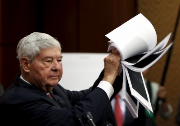 Former senator Bob Graham (D-Fla.) displays 28 pages from the 9/11 Commission report that are still classified...
Former senator Bob Graham (D-Fla.) displays 28 pages from the 9/11 Commission report that are still classified...
For the first time in more than 200 years, Congress merged two standing committees from different houses of Congress: the Senate Select Committee on Intelligence and the House Permanent Select Committee on Intelligence.
The Joint Inquiry had an impressive staff selected due to its members’ experience serving or overseeing key intelligence agencies.
The first order we gave was for the intelligence agencies to preserve any information that might be useful in understanding what happened before, on and after 9/11. While reviewing these files, our experienced staff found documents that raised concerns about the possible involvement of foreign individuals and foreign sources of support for the hijackers.
In several instances, agency leadership conceded that they became aware of this evidence through the probing of the Joint Inquiry staff. On Oct. 10, 2002, then-FBI Director Robert Mueller testified, "I think the staff probed and, as a result of the probing, some facts came to light here and to me, frankly, that had not come to light before, and perhaps would not have come to light had the staff not probed."
The fruit of that probing constitutes the bulk of the material that remains classified. Our final Joint Inquiry Report, released in July 2003 minus the missing 28 pages, reprimanded the agencies for a lack of attention to and action on information in their own files.
This data included "information suggesting specific sources of foreign support for some of the September 11 hijackers while they were in the United States."
At the time, "neither CIA nor FBI officials were able to address definitively the extent of such support for the hijackers." Given the magnitude of the potential risk to national security, the Joint Inquiry found that gap in intelligence coverage "unacceptable" and referred the information summarized in the 28 pages to the FBI and CIA for investigation "as aggressively and as quickly as possible."
The release of the 28 pages would allow the American people to evaluate important questions, such as:
- Should we believe that the 19 hijackers — most of whom spoke little English, had limited education and had never before visited the United States — acted alone in perpetrating the sophisticated 9/11 plot?
- Did the hijackers have foreign support?
- If so, who provided it?
- Brennan stated the 28 pages contain information that is "uncorroborated, unvetted" and "inaccurate." What is the investigatory basis for his conclusion?
- Has the 13-year delay in empowering the American people with the information in the 28 pages affected national security, delayed justice to the families of the nearly 3,000 Americans killed on 9/11 or undermined the confidence of the American people in their federal government?
Former Illinois governor and two-time presidential candidate Adlai Stevenson put it best: "As citizens of this democracy, you are the rulers and the ruled, the law-givers and the law- abiding, the beginning and the end." That unique status gives the American people all the authority and capability needed to review the 28 pages and determine the truth. It is long past time they had the opportunity. Read more
- George F. Will: Histories that shouldn’t be secret
- Fareed Zakaria: Saudi Arabia: The devil we know
- Bob Graham Urges Obama to Reopen Investigation into Saudi Role in 9/11 Attacks; Democracy Now!
Bob Graham Wikipedia
Link to full interview video
C-Span interview with Major Heather Penney, 9/11 DC Air National Guard Pilot
Major Heather Penney recounts the drama in the skies after District of Columbia Air National Guard pilots scrambled to intercept incoming hostile planes. She describes why F-16’s initially took off from Andrews Air Force Base unarmed – and what she was prepared to do to bring down a plane piloted by terrorists. And she recounts how later that day she helped escort President Bush and Air Force One back to Andrews Air Force Base. C-Span Interview
Law Professor Paul Campos, The Daily Beast:
Lloyd's Sues Saudi Arabia over 9/11
Lloyd’s Sues Saudi Arabia for Funding 9-11 Attacks
Solari Blog Catherine Austin Fitts
News & Commentary
By Investor’s Business Daily
Justice: A new 9/11 lawsuit portrays the Saudi government as having more control over al-Qaida charities before the attacks than it (or the US) has admitted. Let’s hear the truth.
Click to read complaint, filed in US court,
Lloyds of London seeks $215 million in damages from the kingdom to recover claims it paid 9/11 victims and their families. The suit charges that the Saudi government funded al-Qaida through its banks and charities.
The complaint, filed in US court, states that without official Saudi sponsorship, "al-Qaida would not have possessed the capacity to conceive, plan and execute the Sept. 11 attacks."
In other words, absent Saudi support, the Twin Towers would still be standing – along with nearly 3,000 Americans.
lloyd's sues saudi's for funding 9-11.pd[...]
Adobe Acrobat document [201.1 KB]
Insurance giant withdraws
9/11 lawsuit against Saudi Arabia
By Daily Mail Reporter
Updated: 14:37 EST, 21 September 2011
An insurance firm has withdrawn its lawsuit against Saudi Arabia, which had claimed the country funded the terrorists responsible for the 9/11 attacks.
A division of Lloyd's of London had filed documents in a U.S. court on September 8 demanding the return of $215million compensation it paid victims.
But the lawsuit has now been dropped.
Attorney Stephen Cozen of law firm Cozen O'Connor, which represents Lloyd's, told Insurance Journal that he cannot comment on why Lloyd’s decided to drop the case less than two weeks after filing the complaint.
Mr Cozen told the journal: 'We were instructed to voluntarily dismiss without prejudice. That of course means that the suit is free to be refiled and certainly similar suits may be filed by others.'
Lloyd's is voluntarily dismissing its lawsuit 'without prejudice,' meaning the motion seeks to close the case without precluding the possibility of renewal at a later date, the court clerk's office said.
The lawsuit - filed in Johnston, Pennsylvania, where United Airlines flight 93 crashed on 9/11, named nine defendants, including a leading member of the oil-rich state's royal family.
Saudi Arabia has always denied claims that Osama bin Laden's organisation received official financial and practical support from his homeland.
And the 9/11 Commission's official report on the attacks, found that there was no evidence that the Saudi government or senior Saudi officials individually funded Al Qaeda. Read online
Al-Qaeda - The Base - Sunni militant organization
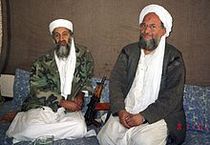 Osama bin Laden sits with his adviser al-Zawahiri during an interview with Pakistani journalist Hamid Mir, in November 2001.
Osama bin Laden sits with his adviser al-Zawahiri during an interview with Pakistani journalist Hamid Mir, in November 2001.
Al-Qaeda
Wikipedia
Al-Qaeda, translation: "The Base", "The Foundation" or "The Fundament" and alternatively spelled al-Qaida, al-Qæda and sometimes al-Qa'ida) is a militant Sunni Islamist global organization founded in 1988[28] by Osama bin Laden, Abdullah Azzam,[29] and several other Arab volunteers who fought against the Soviet invasion of Afghanistan in the 1980s.[30][31][32] It operates as a network made up of Islamic extremist, Salafist jihadists. It has been designated as a terrorist group by the United Nations Security Council, the North Atlantic Treaty Organization (NATO), the European Union, the United States, Russia, India, and various other countries (see below).
Al-Qaeda has mounted attacks on civilian and military targets in various countries, including the 1998 U.S. embassy bombings, the September 11 attacks, and the 2002 Bali bombings. The U.S. government responded to the September 11 attacks by launching the "War on Terror". With the loss of key leaders, culminating in the death of Osama bin Laden, al-Qaeda's operations have devolved from actions that were controlled from the top down, to actions by franchise associated groups and lone-wolf operators. Characteristic techniques employed by al-Qaeda include suicide attacks and the simultaneous bombing of different targets.[33] Activities ascribed to it may involve members of the movement who have made a pledge of loyalty to Osama bin Laden, or the much more numerous "al-Qaeda-linked" individuals who have undergone training in one of its camps in Afghanistan, Pakistan, Iraq or Sudan.[34] Al-Qaeda ideologues envision a complete break from all foreign influences in Muslim countries, and the creation of a new caliphate ruling over the entire Muslim world.[6][35][36]
Among the beliefs ascribed to al-Qaeda members is the conviction that a Christian–Jewish alliance is conspiring to destroy Islam.[37] As Salafist jihadists, they believe that the killing of non-combatants is religiously sanctioned, but they ignore any aspect of religious scripture which might be interpreted as forbidding the murder of non-combatants and internecine fighting.[1][38] Al-Qaeda also opposes what it regards as man-made laws, and wants to replace them with a strict form of sharia law.[39]
Al-Qaeda has carried out many attacks on targets it considers kafir.[40] Al-Qaeda is also responsible for instigating sectarian violence among Muslims.[41] Al-Qaeda leaders regard liberal Muslims, Shias, Sufis and other sects as heretics and have attacked their mosques and gatherings.[42] Examples of sectarian attacks include the Yazidi community bombings, the Sadr City bombings, the Ashoura massacre and the April 2007 Baghdad bombings.[43]
Since the death of Osama bin Laden in 2011 the group has been led by Egyptian Ayman al-Zawahiri. Read more
Hezbollah - Party of God - Shi'a Islamist militant group
Hezbollah
Wikipedia
Hezbollah (literally "Party of Allah" or "Party of God")—also transliterated Hizbullah, Hizballah, etc.[16]—is a Shi'a Islamist militant group and political party based in Lebanon.[17][18] Hezbollah's paramilitary wing is the Jihad Council,[19][20] and its political wing is Loyalty to the Resistance Bloc party in the Lebanese parliament. After the death of Abbas al-Musawi in 1992, the group has been headed by Hassan Nasrallah, its Secretary-General.
After the Israeli invasion of Lebanon in 1982, Israel occupied a strip of south Lebanon, which was controlled by the South Lebanon Army (SLA), a militia supported by Israel. Hezbollah was conceived by Muslim clerics and funded by Iran primarily to harass the Israeli occupation.[4] Its leaders were followers of Ayatollah Khomeini, and its forces were trained and organized by a contingent of 1,500 Revolutionary Guards that arrived from Iran with permission from the Syrian government,[21] which was in occupation of Lebanon at the time. Hezbollah waged a guerilla campaign in South Lebanon—SLA collapsed and surrendered, and Israel withdrew from Lebanon on May 24, 2000.
Hezbollah's military strength has grown so significantly[22][23] that its paramilitary wing is considered more powerful than the Lebanese Army.[24][25] Hezbollah has been described as a "state within a state",[26] and has grown into an organization with seats in the Lebanese government, a radio and a satellite TV station, social services and large-scale military deployment of fighters beyond Lebanon's borders.[27][28][29] Hezbollah is part of the March 8 Alliance within Lebanon, in opposition to the March 14 Alliance. Hezbollah maintains strong support among Lebanon's Shi'a population,[30] while Sunnis have disagreed with the group's agenda.[31][32] Hezbollah receives military training, weapons, and financial support from Iran, and political support from Syria.[33] Hezbollah and Israel fought each other in the 2006 Lebanon War.
Hezbollah's 1985 manifesto listed its objectives as the expulsion of "the Americans, the French and their allies definitely from Lebanon, putting an end to any colonialist entity on our land", submission of the Phalangists to "just power" and bringing them to justice "for the crimes they have perpetrated against Muslims and Christians", and permitting "all the sons of our people" to choose the form of government they want, while calling on them to "pick the option of Islamic government".[34] After the 2006–08 Lebanese protests[35] and clashes,[36] a national unity government was formed in 2008, with Hezbollah and its opposition allies obtaining eleven of thirty cabinets seats, which gives them veto power.[18] In August 2008, Lebanon's new Cabinet unanimously approved a draft policy statement which recognized Hezbollah's existence as an armed organization and guarantees its right to "liberate or recover occupied lands" (such as the Shebaa Farms).[37] Since 2012, Hezbollah has helped the Syrian government during the Syrian civil war in its fight against the Syrian opposition, which Hezbollah has described as a Zionist plot and a "Wahhabi-Zionist conspiracy" to destroy its alliance with Assad against Israel.[38][39] It has deployed its militia in both Syria and Iraq to fight or train local forces to fight against ISIS.[40][41] Once seen as a resistance movement throughout much of the Arab world,[17] this image upon which the group's legitimacy rested has been severely damaged due to the sectarian nature of the Syrian Civil War in which it has become embroiled.[27][42][43]
Hezbollah's status as a legitimate political party, a terrorist group, a resistance movement, or some combination thereof is a contentious issue.[44] The Arab League,[45] United States,[46] France,[47] the Gulf Cooperation Council,[48][49] Australia,[50] Canada,[51] the Netherlands,[52] and Israel[53] have classified Hezbollah as a terrorist organization. The European Union, New Zealand and the United Kingdom[54] have proscribed Hezbollah's military wing as a terrorist organization, while making a distinction with Hezbollah's political wing.[55][56] Russia considers Hezbollah a legitimate sociopolitical organization.[57] China remains neutral, and maintains contacts with Hezbollah.[58] Read more
Islam. Sunni Islam. Wahhabism. Shia Islam. (Wikipedia)
Islam
Wikipedia
Islam (see article for pronunciation) is a monotheistic and Abrahamic religion articulated by the Qur'an, a religious text considered by its adherents to be the verbatim word of God (Allah), and, for the vast majority of adherents, by the teachings and normative example (called the sunnah, composed of accounts called hadith) of Muhammad (c. 570–8 June 632 CE). An adherent of Islam is called a Muslim (sometimes spelled "Moslem").[1] Muslims believe that God is one and incomparable [2] and that the purpose of existence is to worship God.[3] Nearly all Muslims consider Muhammad be the last prophet of God.
Read more - Islam on Wikipedia
Sunni Islam
Wikipedia
Sunni Islam (see article) is a denomination of Islam which holds that the Islamic prophet Muhammad's first Caliph was his father-in-law Abu Bakr. Sunni Islam primarily contrasts with Shi'a Islam, which holds that Muhammad's son-in-law and cousin Ali ibn Abi Talib, not Abu Bakr, was his first caliph.[1][2] Sunni Islam is by far the largest denomination of Islam. As of 2009, Sunni Muslims constituted 87–90% of the world's Muslim population.[3] Its adherents are referred to in Arabic as ahl as-sunnah wa l-jama 'ah (see article), "people of the tradition of Muhammad and the consensus of the Ummah" or ahl as-sunnah (see article) for short. In English, its theological study or doctrine is called Sunnism, while adherents are known as Sunni Muslims, Sunnis, Sunnites and Ahlus Sunnah. Sunni Islam is the world's largest religious denomination, followed by Roman Catholicism.[4][5] Sunni Islam is sometimes referred to as "orthodox Islam".[6][7][8] The word "Sunni" comes from the term Sunnah (see article), which refers to the sayings and actions of the Islamic prophet Muhammad as recorded in the hadith.[9]
Read more - Sunni Islam on Wikipedia
Wahhabism
Wikipedia
Wahhabism (see article) is a religious movement or branch of Sunni Islam.[3][4][5][6] It has been variously described as "ultraconservative",[7] "austere",[3] "fundamentalist",[8] "puritanical"[9] (or "puritan")[10] and as an Islamic "reform movement" to restore "pure monotheistic worship" (tawhid) by scholars and advocates,[11] and as an "extremist pseudo-Sunni movement" by opponents.[12] Adherents often object to the term Wahhabi or Wahhabism as derogatory, and prefer to be called Salafi or muwahhid.[13][14][15] Many Sunni and Shia Muslims disagree with the Wahhabi movement, and believe in a conspiracy theory blaming the British secret service for the founding of the Wahhabi movement.[16] An Al-Azhar scholar has referred to Wahhabism as a "Satanic faith".[16]
Read more - Wahhabism on Wikipedia
Shia Islam
From Wikipedia
Shia (see article), an abbreviation of Shia-ne-Ali, Shi ‘atu ‘Ali (see article, "followers of Ali"), is a branch of Islam which holds that the Islamic prophet Muhammad's proper successor as Caliph was his son-in-law and cousin Ali ibn Abi Talib. Shia Islam primarily contrasts with Sunni Islam, whose adherents believe that Muhammad's trusted aide Abu Bakr was his proper successor.[1]
Read more - Shia Islam on Wikipedia
...........................The Saudi Royal Family.................................
Faisal of Saudi Arabia
Wikipedia
Faisal bin Abdulaziz Al Saud (14 April 1906 – 25 March 1975) was King of Saudi Arabia from 1964 to 1975. As king, he is credited with rescuing the country's finances and implementing a policy of modernization and reform, while his main foreign policy themes were pan-Islamic nationalism, anti-Communism, and pro-Palestinian nationalism.[1][2] He successfully stabilized the kingdom's bureaucracy and his reign had significant popularity among Saudis.[3] In 1975, he was assassinated by his nephew Faisal bin Musaid. Read more
King Faisal and the
Modernisation of Saudia Arabia
Edited by Willard A. Beling
King of Saudi Arabia
Wikipedia
The King of Saudi Arabia is Saudi Arabia's head of state and absolute monarch (i.e. head of government). He serves as the head of the Saudi monarchy — House of Saud. The King is called the Custodian of the Two Holy Mosques. The title, which signifies Saudi Arabia's jurisdiction over the mosques of Masjid al Haram in Mecca and Masjid al-Nabawi in Medina, replaced His Majesty in 1986.
Salman of Saudi Arabia
Wikipedia
Salman bin Abdulaziz Al Saud (born 31 December 1935) is the King of Saudi Arabia, Custodian of the Two Holy Mosques and the head of the House of Saud.[1]
He served as the Deputy Governor and then the Governor of Riyadh for 48 years from 1963 to 2011. He was appointed as Minister of Defence in 2011. He was also named the Crown Prince in 2012 following the death of his brother Nayef bin Abdulaziz Al Saud. Salman was crowned as the new King of Saudi Arabia on 23 January 2015 following the death of his half brother, King Abdullah. Among the most notable events during his reign so far have been Saudi Arabia's military intervention in the Yemeni Civil War, the 2015 Mina stampede during the Hajj, and the execution of Nimr al-Nimr and 46 other opponents of the regime on 2 January 2016.
................T. E. Lawrence - - Lawrence of Arabia...................
T. E. Lawrence
Wikipedia
Thomas Edward Lawrence CB DSO FAS (16 August 1888[5] – 19 May 1935) was a British archaeologist, military officer, and diplomat. He was renowned for his liaison role during the Sinai and Palestine Campaign and the Arab Revolt against the ruling Ottoman Empire. The breadth and variety of his activities and associations, and his ability to describe them vividly in writing, earned him international fame as Lawrence of Arabia—a title used for the 1962 film based on his First World War activities. Read more
Who Was T. E. Lawrence? NYT Book Review
‘Lawrence in Arabia,’ by Scott Anderson

